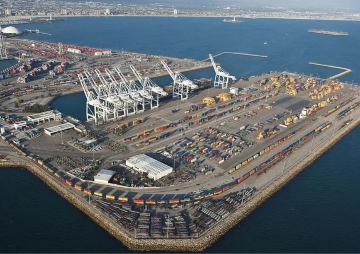The contours of the fledgling peace process with the People's War Group (PWG) Naxalites in Andhra Pradesh are gradually emerging. It is the second attempt in as many years. The Home Minister of Andhra Pradesh, K Jana Reddy, announced on June 29, 2004 that the government has requested S R Sankaran, a retired Secretary to Government and Andhra Pradesh-cadre officer of the Indian Administrative Service (IAS), to be the coordinator of a mediators committee whose other members are likely to be named soon. Separately, a day later, on June 30, the PWG, too, announced the names of those who it wanted to act as mediators. The name of Sankaran figured in the PWG list, too.
Sankaran is the founding Convener of the Committee of Concerned Citizens (CCC), which has been making efforts to bring the government and the Naxalites to the negotiating table. He is well-meaning; and has a clear agenda--help in putting an end to nearly two-and-a-half decades of violence and herald peace. The PWG's agenda, as it obtains now, for the proposed peace talks is at best unclear.
The PWG's statements during the preliminary stages of the aborted 2002 peace process, and at the present juncture, did not mention its demands. The Home Minister of Andhra Pradesh said on June 8, 2004 that he was, as on that date, not aware of the agenda of the Naxalites for the peace talks. Indeed, the PWG, too, is not aware. There is no indication as yet (July 2, 2004) to believe that it has already chalked out the agenda it would place before its interlocutors. The Andhra Pradesh government is, thus, gearing itself to holding negotiations with a group that has, after over 24 years of its founding in 1980, not been able to unambiguously articulate its agenda. Probably, the PWG has been (and is) firm in its mind that it would wage an armed insurrection to capture political power, and would, left to itself, never want to enter into negotiations with the government. However, pressure from the civil society and the intense losses it has suffered in the State, especially in its flagship North Telengana Special Guerrilla Zone, pushed the PWG into agreeing to initiate talks with the State government.
Nevertheless, it might be useful to ponder over the demands that the PWG is likely to place before the government during the proposed talks and the objectives it hopes to achieve. These can be gauged in the light of the developments during the aborted 2002 peace process. At the time, the PWG stated, "In the talks, an agenda with the people's democratic aspirations as the basis has to be prepared. At least, the freedom to fight for minimum democratic rights has to be secured. Not only that, the debate should be based on the wide ranging interests of the people, like what are the forces that hamper peaceful atmosphere and development, what is the 'necessary effort' to achieve peace and development, etc." Thus, it could be inferred that the PWG's principle objective has been to secure a legal status for itself, or in other words, make the government to de-proscribe the outfit; ensure that the various agencies of the state would observe Rule of Law; tackle corruption and secure an assurance that the government would be more responsive to people's needs. There is little to suggest that there has been any change in these objectives since 2002.
In what was, perhaps, an exercise to chart out an agenda, the PWG had circulated in 2002 a Questionnaire among some quarters inviting suggestions on its agenda. The PWG asked, "What issues can be taken up for the agenda of talks? Which of the following can be included or omitted and what are the other issues to be taken up? The outfit listed the following:
(a) The land issue: Section 1 of 70 of Tribal Regulation Act; Pattas (titles) to be granted to occupied lands; Land reforms; Withdrawal of cases against people who occupied lands; Remunerative prices and imposition of restrictions on agricultural imports (WTO); New Agricultural Policy and its negative impact; Suicide deaths by farmers; Drought and resultant migration of people; (b) Hike in electricity prices, withdrawal of subsidies to farmers; (c) Privatisation and closure of industries; (d) Attacks on the downtrodden (dalits); (e) Prohibition, issues of women; (f) Telangana issue; (g) Launching new irrigation projects; (h) Private armies and armed gangs: their relations with the Government and police, their acts of killings (i) Killings by the police in the name of encounters: Judicial enquiry into the 1999 killings of PWG leaders Shyam, Mahesh, and Murali, and the killings of Madhusudhan Raj and Veeranna; (j) State Violence and Civil rights; (Unwarranted) Police firing such as Basheerbagh incident; (k) Raids on houses and families and activists; Attacks on employees; Attacks on mass organizations; and (l) Corruption among the police and politicians.
The PWG also wanted to know if it could include among the demands the release of detained Naxalites who it holds are political prisoners; and any other issues concerning the people, and the 'important ones among them'. There is, however, no information in the public domain on the feed-back it had received from its respondents, nor who the respondents, indeed, were. Also, the PWG said in a note in 2002 that it would have demanded de-proscription, as well, during the talks. This time round, even though the PWG's agenda is yet not clear, it could, perhaps, comprise largely of most of the issues cited above.
The crucial question is: Will the PWG give up its armed struggle if the Andhra Pradesh government were to meet its demands? The answer is an
unambiguous no . The PWG has never indicated till date that its cadres would lay down weapons, give up armed struggle and join the mainstream. On the other hand, it has indicated time and again that its commitment to armed struggle is unswerving. When Andhra Pradesh Chief Minister YS Rajasekhara Reddy made a statement to the effect that the PWG would give up its armed struggle if the proposed talks succeeded, the PWG point person for the peace talks and secretary of the AP State Committee, Akkiraju Haragopal 'Ramakrishna', was not amused.
Further, speaking on June 7, 2004, two prominent pro-Naxalite persons, revolutionary writer Varavara Rao and balladeer Gaddar said, 'there is no difference in the attitudes of the earlier Telugu Desam Party (TDP) government that had insisted on the PWG laying down weapons if talks peace were to be held, and the incumbent Congress government that has been thinking that peace talks are meant for the PWG relinquishing armed struggle'. The latest (July 2004) issue of
People's March , a Naxalite mouthpiece, quoted the all India President of the People's Union For Civil Liberties (PUCL) and said:, "Dwelling at length on the philosophy of the PW,
Kannabiran felt that no policy initiative of the government would alter the belief of the extremists with regard to their movement."
Earlier, in 2002, the PWG said in a note to the government signed by its representatives, Varavara Rao and Gaddar, "… never in the last six years of efforts--in the proposals of the CCC and its efforts, in various statements, proposals and efforts by various civil and democratic rights organizations and individuals--this demand <"to bring members of PW to (the) mainstream by giving up armed struggle"> was put forth. Its note was titled, 'Whose demands are Unrealistic? Who has been flexible?' While the PWG primarily objected to the government floating the idea (of the Naxalites giving-up armed struggle) even as the modalities for the aborted 2002 talks were being discussed, it deliberately refrained from stating unambiguously if it would, indeed, withdraw its armed struggle; neither did it provide an insight into what its notion of 'the mainstream' was. The rebels said: "We do not want to discuss it here". All these statements, thus, leave little doubt that the PWG is as committed, today, as it was in the past to an armed insurrection.
Besides, there is a total mismatch between the objectives of the PWG and those of the government and the aspirations of the people. The PWG wishes to use the negotiations as an avenue to secure (a) de-proscription; (b) perhaps, the release of some of its detained leading figures; (c) fulfillment of some of the demands which it could then showcase to the people as a significant achievement and, thus, seek to enlarge its support base; (d) convey the impression that there is no alternative to its politics and methods. Besides, the PWG, like other similar groups might want to use the period of talks to regroup, consolidate and rearm.
On the other hand, indications are that the government is under the impression that negotiations would eventually culminate in the PWG giving up it s armed struggle in the State and, perhaps, the government is also of the view that the rebels would thereafter function like any other political party. However, that will never be the case; the government has locked itself in an imaginary world. The PWG has no inclination of giving up its armed activities, and this could be gleaned from the preceding paragraphs. Moreover if the PWG were to, indeed, give up armed struggle it would then be no different from the other over-ground Naxalite groups--who it says are revisionist--and as a result, its credibility as a revolutionary party would be thoroughly undermined. Also, it would put the outfit in a peculiar situation where it would continue to maintain armed cadres in some other States, while disbanding them in Andhra Pradesh.
Eventually, what, then, would be the outcome of the proposed negotiations? In all likelihood, if the PWG and the Andhra Pradesh government actually meet at the negotiating table, they would be agreeing upon the rules of their respective engagements in the future. In other words, they would agree to disagree on a number of proposals and agree upon a narrow list of dos and don'ts' that each would be following in the future. Thus, the peace talks would in no way result in the PWG rank and file surrendering arms and joining the mainstream.
* Views expressed in this article are those of the author and do not necessarily reflect those of Observer Research Foundation.
The views expressed above belong to the author(s). ORF research and analyses now available on Telegram! Click here to access our curated content — blogs, longforms and interviews.




 PREV
PREV

